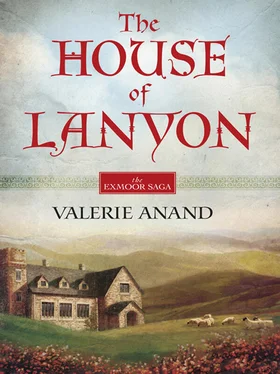The women were still there, gleaning, nearer to the path now, and they looked at her curiously. One of them—Liza recognised her as Bridget, the wife of another weaver—said, “Are you all right, m’dear? You look a bit mazed and sad-like.”
That was when she realised she was crying. She wiped her knuckles across her eyes. “It’s nothing.” They went on staring at her and she told them one small part of the truth. “I think I’m going to be married but I don’t know him very well and…”
“Ah, that’ll come right soon enough,” Bridget said kindly. “Don’t ’ee worry, now. Nicholas’ll not agree to anything but what’s good for thee. Don’t ’ee fret a moment longer. You’ll be as happy as a lark, and think of all they pretty babes that’ll come!”
“Of course,” said Liza, now determinedly smiling. “Of course I know you’re right.”
Whatever happened she mustn’t have red eyes when she reached home. With a frightened jolt she realised she had been away without explanation for quite a long time, and that her parents knew there was gossip about her.
She must find an excuse for her absence. She could say she had wanted to go for a walk and when passing through the lobby had overheard her father talking about marrying her to Peter Lanyon. That she hadn’t meant to listen but had accidentally heard that much. So she had walked to St. George’s church to pray for happiness in her future, and then walked back across the stubble field. Yes, that would do, and if Bridget should ever mention seeing her, it would fit in.
CHAPTER FIVE
UNTIMELY AUTUMN
With an effort that felt like pulling her heart out of her body, Liza arranged another smile on her face as she approached her home, only to realise, on reaching it, that she needn’t have troubled. Her family was in the middle of one of its noisy crises. Dirk, the younger of the two menservants in the Weaver establishment, was up astride the roof ridge along with her cousin Laurie, doing something to a chimney, and she could hear shouting within the house while she was still several yards away.
As she stepped inside, the smell of soot assailed her nostrils and the shouting resolved itself into confused cries of annoyance from women in the main room, and a furious bellowing from the back regions, which she recognised as the voice of one of the older cousins, Ed, declaring that soot was blowing into the fleece store and would somebody shut that accursed door before the whole lot had to be washed a second time!
She walked into the living quarters and her mother and one of the maidservants, both liberally smeared with dirt, turned from the business of sweeping up a shocking mess of soot and disintegrated bird’s nest, which had apparently come down the chimney and mingled with the revolting remains of a fire over which someone had tossed a pail of water. Above it, the filthy and battered remains of what had once been a thin tree branch waved and waggled, presumably because Laurie and Dirk on the roof were agitating it. “What in the world…?” said Liza.
“The chimney were blocked,” said Margaret. “Where’ve you been?”
“I just went out to take the air. I went to St. George’s and—”
“You and your walks.” But Great-Uncle Will had advised them not to challenge Liza, and Margaret, distracted by domestic upheaval, didn’t at that moment want to. “Find a broom and help us out. Fine old muddle this is, I must say. Spring-cleaning in October. I never did hear the like.”
No need after all for excuses or lies. She’d got away with it. Thanking the saints for her good luck, Liza made haste to be useful. Later in the day, when order had been restored and dinner eaten, her parents called her to their room, and she felt alarmed, but their faces were kind. They simply wanted to talk about her marriage. Nothing less, but nothing more, either. If her absence in the morning had aroused any doubts, they evidently didn’t mean to mention them—unless Liza herself was foolish enough to be difficult. She knew her kinfolk very well indeed.
“The whole family has discussed it now,” her father said, coming to the end of his explanation. “We’ve agreed it’s a good thing for you. Peter Lanyon is young and healthy. The business side is not ideal, but it may work out well. Anyway, we intend to say yes.”
“I understand,” said Liza nervously. Since she had not had to invent an excuse for her absence in the morning, she had taken care, throughout the interview, to look as though the notion of Peter Lanyon as her bridegroom were a complete surprise. She added, “It’s a big thing for me.”
“Naturally. Have you any objection?” Nicholas asked. Her parents were both watching her sharply. Well, she’d better allay their suspicions before they voiced them. She dared do nothing else.
“No, Father. I…I’m sure it’s a good thing.” She must, must be the sensible Liza her family wanted her to be. She shuddered to think of the storm of wrath the truth would arouse, and besides, Christopher might suffer. She made herself smile again. Would she have to spend the rest of her life forcing the corners of her mouth upward when all she wanted to do was cry and cry?
Well, if so, so be it. She had no alternative.
Christopher, on his way to Alcombe, felt like crying, too, but except for that one uncharacteristic fit of emotion during their first meeting in the dell, he was not in the habit of shedding tears. He must face it. He had lost Liza for good and what had been between them must remain a secret for all eternity. They had known it would be like this one day. It felt worse than he had expected, that was all. It was like an illness, but he supposed he would recover someday. And so, of course, would Liza. At the thought of Liza forgetting him, he did find tears attempting to get into his eyes, but with a highly unclerical oath he repressed them and rode on.
At that very moment, at Allerbrook farm, another unsanctioned love affair was disturbing the air. It had been secret until now, and its emergence into the light had thrown Richard Lanyon into a dramatic fit of temper.
“Marion Locke? Who in God’s name is Marion Locke? I’ve never heard of her! You’re going to marry Liza Weaver—it’s all settled! Who’s this Marion Locke? Where did you find her? There’s no Locke family round here!”
Richard Lanyon stopped, mainly because he had run out of breath. He stood glowering in the middle of the room, the same room in which George’s coffin had lain awaiting its funeral. He had shouted so loudly that the pewter on the sideboard rang faintly as if trying to echo him.
“She lives on the coast. In Lynmouth, Father. I met her at the Revel there, in June.”
“Lynmouth? That’s as far as Dunster, the other way. I remember you went to the Revel. Well, half of Somerset and Devon go to it—young folk have to enjoy themselves. I’ve no quarrel with that, and if you’ve had a loving summer with some lass there, I’ve no quarrel with that either. Young men have their adventures. I did, in my time. But that’s one thing and marriage is another. How have you managed to visit her since? Oh!” Richard glared at his son. “Now I recall. Two weeks back, we drove the moor for our bullocks and somehow or other you got yourself lost in a mist, you that’s known the moor all your life. Came home hours late, after the cattle were all in the shippon, and said you’d mistaken the Lyn for the head of the Barle and thought you were going southeast instead of north. I thought your brains had gone begging, and all the time…”
Peter stood his ground. “Yes, I saw her then. Other times were when I said I’d ride out to see how the foals or the calves were doing. It came in useful that we’re allowed to run stock on the moor. I’ve seen her twice a month since we first met. Marion visits relations—a grandmother and an aunt—in Lynton, at the top of the cliff, on the first and third Tuesdays of each month. We arranged it so I’d meet her in Lynton whenever I could.”
Читать дальше












